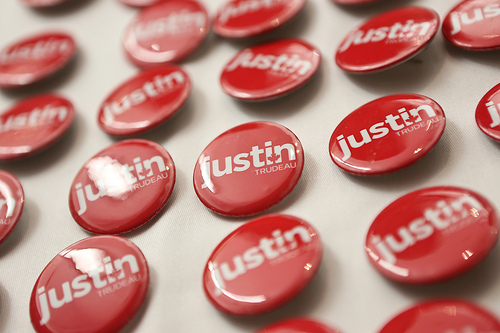For my sins, I found myself spending last Saturday at the final speeches in the Liberal leadership race. The snorefest lasted exactly four hours but felt like four days. Has so little excitement ever been generated by so many candidates among so many partisans in the annals of our species?
Heaven knows where the Liberal Party would be today were it not for Justin Trudeau, whose coronation this weekend is merely a formality.
We now have the answers to three of the central questions at the heart of Canadian political life today.
First, the possibility of collaboration of any kind, at any level, between the NDP and the Liberals is as dead as Monty Python’s parrot. After all, Mr. Trudeau was not exactly beginning a negotiation on Saturday when he dismissed the NDP as “a Frankenstein’s monster.” So an initiative that had intrigued many for the past year is peremptorily buried, rejected by those who control both parties.
Let’s just hope that Joyce Murray’s valuable focus on the environmental crisis isn’t forgotten quite as abruptly.
Second, and directly related, the Liberal Party of Canada is once again a serious contender. Who’d have thunk it possible?
Third, forget the idle speculation about whether Stephen Harper will lead his party in the next election. He will. You heard it here first.
As a result, the future is completely up for grabs and anything now seems possible in the next election.
The most immediate question, being watched intensely by his rivals, is whether the mini-Trudeaumania of the leadership campaign can be sustained. It’s certainly possible yet far from inevitable. The Liberals have a superficially popular leader but no real party, no raison d’etre, no geographical base and no policies beyond loving Canada and that hollow old liberal/Liberal chestnut, equality of opportunity. It’s quite impossible to guess how this strange creature will do.
Thomas Mulcair won the NDP leadership because he felt completely credible not only as Leader of the Opposition but also as a potential Prime Minister. With all the good will in the world, it’s hard to make the same statement about JT without giggling. That he exudes a certain charisma is undeniable. In some mysterious way, impossible either to fake or replicate, he clearly inspires hope in many Canadians, much, ironically, as Jack Layton did near the end of his life. But with these fuzzy qualities comes a kind of hippie-dippie innocence, a sophomoric sense that love and sincerity conquer all obstacles, a throwback to The Age of Aquarius.
How will this play out against the a cool, ruthless Stephen Harper in the House of Commons? What happens when the malicious Conservative attacks begin? Or when Trudeau is compared with Mulcair in terms of the gravitas, the seriousness, to run this ornery country? Impossible to predict.
Yet no one can be unaware of Trudeau’s remarkable impact already on public opinion, as all polls show. While they disagree on exact numbers, it’s clear enough the Liberals have catapulted back into the 30 per cent range, from 19 per cent and near-death in the last election. The Conservatives have plummeted from just under 40 per cent to closer to 30 per cent. And the NDP has slipped below the Liberals from 30 per cent to 27 per cent or less. As things now stand, it’s anybody’s ballgame.
Of course Mr. Harper can bask in the knowledge that he still faces a split opposition on the centre-left. But he shouldn’t feel too smug. His own coalition of social conservatives, economic conservatives, pragmatic conservatives (i.e. lovers of power over ideology) and libertarians is itself showing public signs of a split, as his social conservative caucus openly chafes at the PM’s adamant refusal to re-open the abortion debate.
It’s a weird time for this merry band of Tea Party wannabes. They’ve completely lost the gay issue to public opinion and the abortion issue to Mr. Harper’s good political sense. These were their big obsessions. Yet they’ve triumphed on gun control, law ‘n order, the military and the monarchy. Whether they can be convinced to remain invisible for another couple of years is far from certain, as the Prime Minister well knows.
As for the NDP, it’s holding on, really all that could be expected for the moment under the circumstances. 27 per cent in the polls is no mean achievement for a party that rarely in its history ever won 20 per cent of the vote. Maybe that’s why, given the compassion for which New Democrats are renowned, the party apparently thought it should offer some gifts to its opponents.
Unbeknown to any known living human being until now, the party’s constitution has for decades apparently contained some impenetrable leftist jargon not heard since Tommy Douglas wore diapers: “the production and distribution of goods and services,” “monopolistic productive and distributive organizations,” “social ownership.” Somebody in the NDP shrewdly decided the party had to publicly resurrect this extinct ideological gobbledygook in order to eliminate it.
What the NDP really stands for, as Thomas Mulcair repeatedly affirmed again this week, is reducing social and economic inequality — the grand goal of all shades of leftists throughout history. Except, it seems, the Liberal Party of Canada and its new leader. Tis a pity. If only Justin Trudeau had embraced such a goal, Canada’s future would seem much brighter today.
This article was first published in the Globe and Mail.
Photo: Adam Scotti/Justin Trudeau/Flickr



